Perhaps, Georg Orwell's worst nightmare has come true in the wake of whistleblower Edward Snowden's startling revelations of secret government surveillance.
Writing under the title, "So Are We Living in 1984?" Ian Crouch of New Yorker argued that Edward Snowden, sounded, in the Guardian interview in which he came forward, like he'd been guided by Orwell's pen.
by YouTube
The book aims to serve as a warning for what can happen when government overextends its powers; the term "Orwellian" has become associated with the idea of a totalitarian society. The haunting, but much-loved, book celebrated its 60th anniversary on June 6 amid the backdrop of real-life controversy that made the novel seem more prophetic than fictional.
Not surprisingly, sales of 1984 have been soaring in the wake of startling revelations of secret government surveillance. Now, sales of George Orwell's classic have spiked -- increasing by an incredible 337% on Amazon.com. As of noon on June 11, the book was number 5 on the "movers and shakers list," which represent the biggest gains in sales over the past 24 hours.
Are we living in "Nineteen Eighty-Four", the New Yorker asked and added: The technological possibilities of surveillance and data collection and storage surely surpass what Orwell imagined .
According to Silicon Beat, a San Francisco man has
started a movement called "Flood Washington with 1984."Brian Morearty, an
independent
His official goal is to send 100,000 copies to Washington by July 4, although he told Silicon Beat in an email there's no real way for him to know when that goal is reached. Morearty said he sent a copy of "1984"- to Senator Feinstein's Washington, D.C., office. Feinstein says Snowden is a traitor. "I don't look at this as being a whistleblower. I think it's an act of treason."
ACLU sues over NSA phone records program
On June 11, the American Civil
Liberties Union sued the Obama administration, asking the government to halt a
phone-tracking program that collects the telephone records of millions of
Americans and that it says is unconstitutional. The lawsuit was filed in
federal court in New York by the American Civil Liberties Union, along with the
New York Civil Liberties Union.
"The practice is akin to
snatching every American's address book--with annotations detailing whom we
spoke to, when we talked, for how long, and from where," the lawsuit says.
"It gives the government a comprehensive record of our associations and
public movements, revealing a wealth of detail about our familial, political,
professional, religious, and intimate associations."
The phone-records program, disclosed
last week by Britain's Guardian newspaper, collects customer "metadata," including
the phone numbers dialed and the length of calls -- and, senators said, location
data, which intelligence analysts use to detect patterns and personal
connections. The administration said that the program does not monitor the
content of calls and that it has been reviewed by a secret surveillance court
and Congress.
A separate Internet surveillance
program, known as PRISM, allows the NSA to collect videos, photos, e-mails,
documents and connection logs for foreign users thought to be located overseas through
nine leading Internet companies. The government obtains the data through orders
approved by the secret court established by the Foreign Intelligence
Surveillance Act. That program was disclosed by The Washington Post and the
Guardian.
According to the Associated Press,
the lawsuit--which names as defendants the heads of national intelligence as
well as the agencies they lead, including the National Security Agency, the
FBI, the Department of Defense and the Department of Justice--also asks the
court to purge phone records collected under the program, claiming the
government action violates the First and Fourth Amendments of the Constitution.
The ACLU claims standing as a former
customer of Verizon, adding that the government likely has much of its metadata
stored in its databases.
The suit also alleges the government's program exceeds the congressional authority provided by the Patriot Act and singles out a particular provision that has given the government more leeway in obtaining
(Note: You can view every article as one long page if you sign up as an Advocate Member, or higher).






